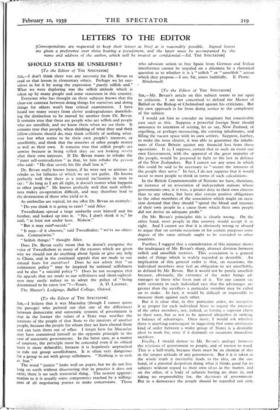LETTERS TO THE EDITOR
[Correspondents are requested to keep their letters as brief as is reasonably possible. Signed letters are given a preference over those bearing a pseudonym, and the latter must be accompanied by the name and address of the author, which will be treated as confidential.—Ed. THE SPECTATOR]
SHOULD STATES BE UNSELFISH?
[To the Editor of THE SPECTATOR]
don't think there was any necessity for Dr. Bevan to read us that lesson in elementary ethics. Perhaps we let our- selves in for it by using the expression "purely selfish end." What we were deploring was the selfish attitude which is taken up by many people and some statesmen in this country.
Everyone who has thought on these subjects knows that the clear-cut contrast between doing things for ourselves and doing things for others won't bear critical examination. I have heard too many essays from clever undergraduates demolish- ing the distinction to be moved by another from Dr. Bevan. It remains true that there are people who are selfish and people who are unselfish, and we know them when we see them. It remains true that people, when thinking of what they and their fellow-citizens should do, may think selfishly of nothing what- ever but what seems to be their own people's interests, or unselfishly, and think that the miseries of other people matter as well as their own. It remains true that selfish people are unwise because in being selfish they are not looking wisely after their own interests. If Dr. Bevan wants to rebuke the "inner self-contradiction" in that, let him rebuke the person who said: "He that saveth his life shall lose it."
Dr. Bevan really knows better, if he were not so anxious to rebuke us for fallacies of which we are not guilty. He knows perfectly well that there is a natural inclination in men to say: "As long as I am all right, it doesn't matter what happens to other people." He knows perfectly well that such selfish- ness makes co-operation difficult, and may therefore lead to the destruction of those who yield to it.
As umbrellas are topical, let me offer Dr. Bevan an example : "Do you think it is going to rain? "said Alice.
Tweedledum spread a large umbrella over himself and his brother, and looked up into it. "No, I don't think it is," he said; "at least not under here. Nohow."
"But it may rain•outside."
"It may—if it chooses," said Tweedledee; "we've no objec- tion. Contrariwise."
"Selfish things!" thought Alice.
Does Dr. Bevan really mean that he doesn't recognise the voice of Tweedledurn in many of the excuses which are given why we should not do anything about Spain or give any help to China, and in the continual appeals that are made to our natural fears for ourselves? Does he not admit that an isolationist policy" may be inspired by national selfishness and be also "a suicidal policy "? Does he not recognise that the appeals that are made to our selfishness and short-sighted- ness may easily induce us to adopt the policy of "being














































 Previous page
Previous page